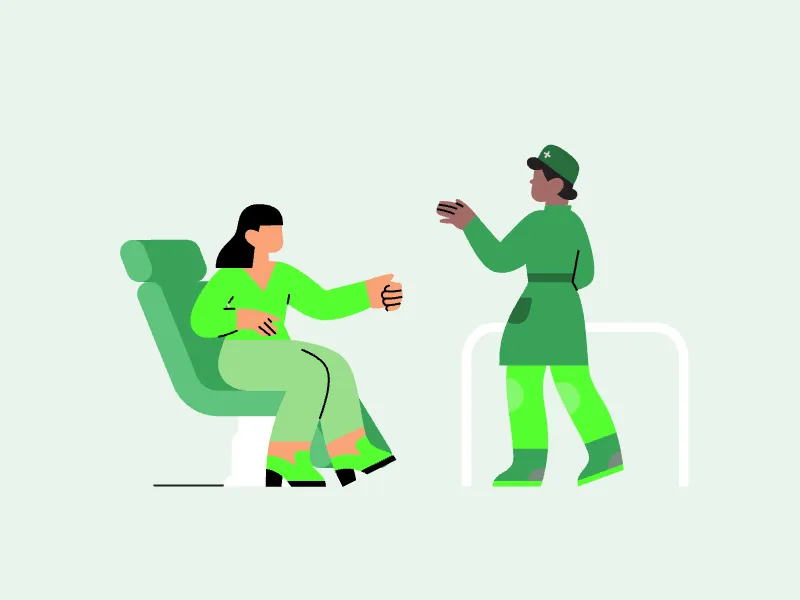Anxiety disorders in individuals with bulimia nervosa
The link between bulimia nervosa and anxiety is strong. According to data from the National Institute of Mental Health, 80.6% of people with bulimia nervosa will experience an anxiety disorder at some point during their lives (1) and a study in The American Journal of Psychiatry found that 68% of individuals with bulimia nervosa had at least one anxiety disorder. (2)
Anxiety is common among those who have a bulimia nervosa diagnosis, but the co-occurrence of anxiety and bulimia nervosa depends upon the specific anxiety disorder. Research has produced the following data about anxiety disorders and bulimia nervosa: (2)
- 40% of people with bulimia nervosa have an obsessive-compulsive disorder (OCD) diagnosis.
- 16% have a social phobia.
- 13% have post-traumatic stress disorder (PTSD).
- 11% have a panic disorder diagnosis.
- 8% have generalized anxiety disorder.
Which comes first: anxiety or bulimia nervosa?
Given the high co-occurrence of bulimia nervosa and anxiety disorders, some people may wonder if one causes the other. The answer, in short, is that it depends upon the person and is likely more complicated than a 1 to 1 causal relationship. Among people who have both an eating disorder and OCD, the OCD diagnosis came before the eating disorder for 62% of them. In people with an eating disorder and a social phobia, the social phobia comes first for 74% of the time. Finally, in those with generalized anxiety disorder, 65% are diagnosed with anxiety before an eating disorder, and 41% of those with PTSD experience the anxiety disorder diagnosis prior to the diagnosis of an eating disorder. (2)
Based upon these data, it seems that OCD, social phobia, and generalized anxiety disorder are more likely to occur before an eating disorder like bulimia nervosa develops, whereas PTSD is more likely to occur at the same time, or after the development of an eating disorder. The data also show that for people with panic disorder and an eating disorder, 71% of them develop the panic disorder at the same time or after the eating disorder diagnosis. (2)
In some cases, an anxiety disorder comes first and may contribute to causing the eating disorder. In other instances, it is possible that the eating disorder causes anxiety, but the relationship may not be quite that simple. It is also likely that certain factors predispose some individuals to developing both anxiety disorders and eating disorders, and the order in which they are diagnosed does not fully capture this relationship.
What explains the bulimia-anxiety overlap?
For some people, anxiety develops before bulimia nervosa, and for others, anxiety occurs at the same time as an eating disorder or develops after the onset of the eating disorder. It could be possible that anxiety causes bulimia nervosa when anxiety develops first, and vice versa, but the order in which each diagnosis develops doesn’t necessarily mean that one disorder causes the other. Depending on how each condition manifests, diagnosis order may be determined by which one produces more visible symptoms, rather than which one began first.
Bulimia nervosa and anxiety may be related because of common symptoms. For example, researchers have found that avoidance of social eating, which is a common eating disorder symptom, may explain the overlap between eating disorders and anxiety, because several anxiety disorders can involve a fear of eating in front of others. Furthermore, poor self-esteem and lack of self-confidence are common in both anxiety and eating disorders. People who have these traits may be more prone to eating disorders like bulimia nervosa, because they utilize physical appearance as a means to evaluate and regulate their self-worth. (3)
Other research suggests that specific personality traits and genetic factors may contribute to the development of both bulimia nervosa and anxiety. For example, the personality trait of neuroticism, which is characterized by worry, anxiety, and hypersensitivity, has been found to increase the risk of binge eating, which is a symptom of bulimia. Furthermore, there are genetic factors that are linked to both neuroticism and binge eating, which suggests that the overlap between anxiety and bulimia nervosa may be a result of shared genetic risks. (4)
What we can conclude about anxiety and bulimia nervosa
Can bulimia nervosa cause anxiety, or does anxiety cause bulimia nervosa? The answer isn’t entirely clear, but what is evident is that bulimia nervosa and anxiety have a high co-occurrence. For some anxiety disorders, including generalized anxiety disorder, OCD, and social phobia, it is more likely that the anxiety disorder comes before bulimia nervosa, rather than being caused by bulimia nervosa. If an anxiety disorder is diagnosed after a bulimia nervosa diagnosis, it is possible that bulimia nervosa causes anxiety, but an alternative explanation is that bulimia nervosa and anxiety have similar risk factors as well as some overlapping symptoms.
Regardless of whether bulimia nervosa or anxiety comes first, what is certain is that if a person has co-occurring anxiety and bulimia nervosa, it is important to seek treatment for both conditions. If eating disorder symptoms are treated but anxiety remains unaddressed, this may trigger a relapse in eating disorder behaviors in order to cope. Similarly, an untreated eating disorder can cause a reappearance of anxiety.
If you are living with both bulimia nervosa and anxiety, help is available. Working with a treatment team of eating disorder professionals can help you to develop skills to manage anxiety and develop a healthier relationship with food and your body.






























